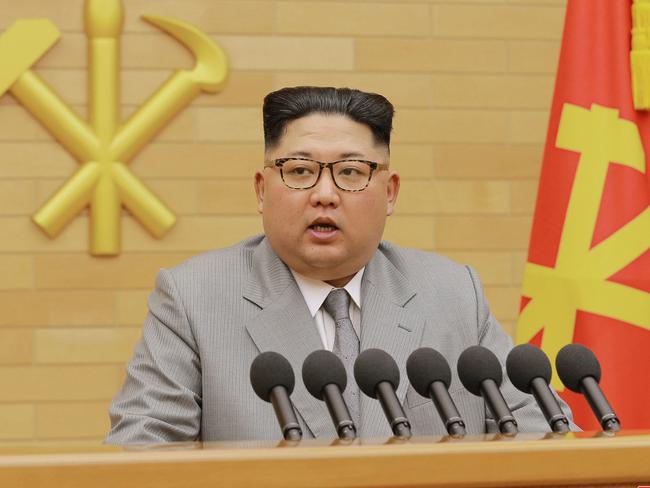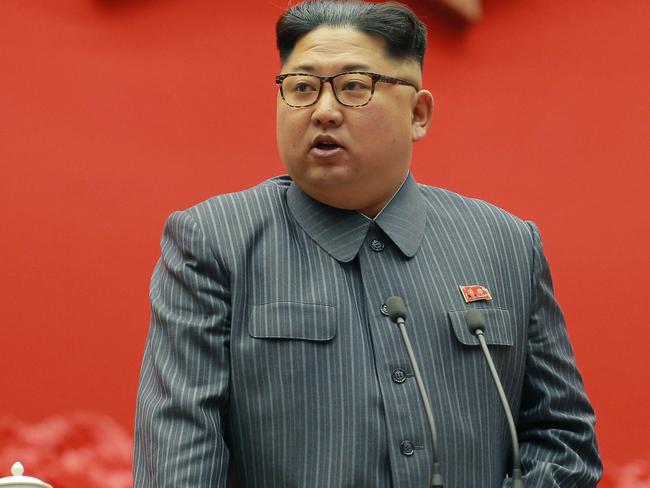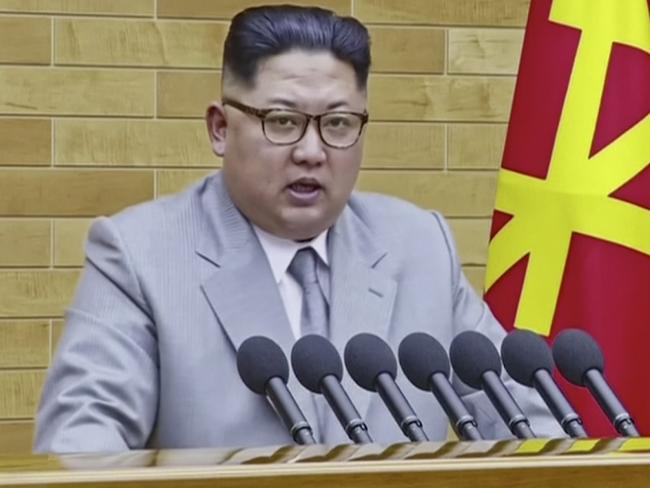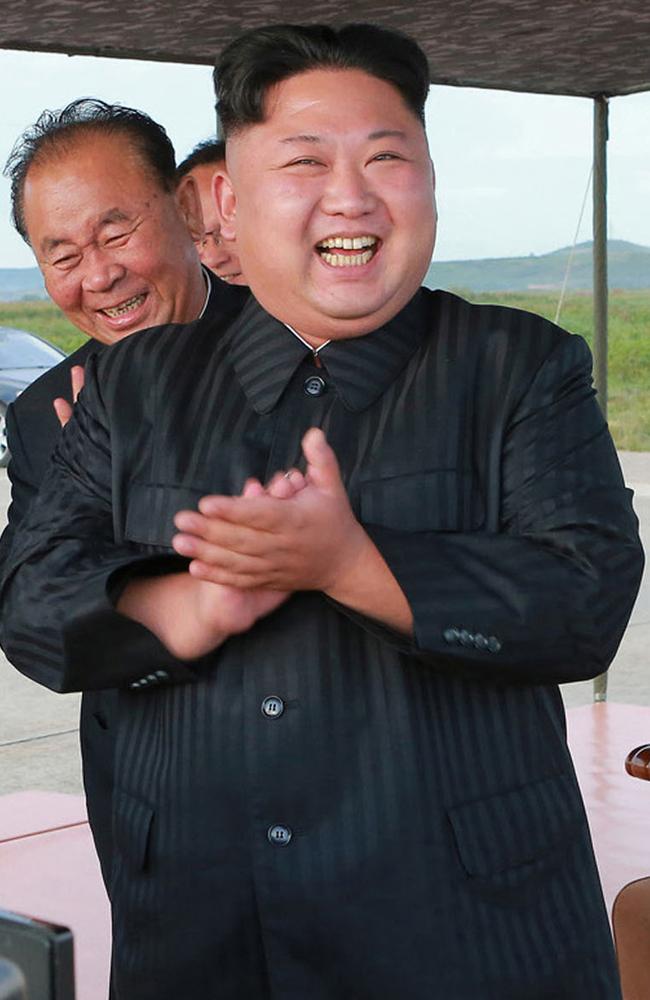Kim Jong-un’s new suit, change of tone leads to speculation about North Korea’s motives
KIM Jong-un surprised with his New Year’s Day address but it wasn’t just his threats of nuclear war that’s raised eyebrows.
IT’S not usually Kim Jong-un’s outfit that raises eyebrows, but it seems the new year may have inspired a new man.
The North Korean leader was seen wearing a Western-style grey suit in his New Year address in which he said the “nuclear button is always on my desk.”
The “diplomatic makeover” was a far cry from his signature dark Mao-style suits and led to speculation over whether 2018 could mark a change of tack for the supreme leader.
The fact it came paired with a softer tone towards South Korea and the possibility he could send athletes to the South Korean Winter Olympics has left analysts divided over whether it’s a genuine olive branch or a “canny” move to drive a wedge between South Korea and the hard line US approach.


US President Donald Trump said the decision to engage with South Korea showed the impact sanctions are having on the rogue state.
“Soldiers are dangerously fleeing to South Korea. Rocket man now wants to talk to South Korea for first time. Perhaps that is good news, perhaps not — we will see!” he tweeted on Tuesday.
Seoul’s University of North Korean Studies Professor Yang Moo-Jin told AFP: “Kim Jong-un’s silver Western-style suit and horn-rimmed glasses, as well as the fact that he was not wearing a badge of his grandfather and father, shows his confidence and stability. It signals that he is in control.”
Pusan National University Associate Professor Robert Kelly described him as looking more like “a banker, wearing Armani”.
“There has been a lot of speculation that he is trying to make North Korea look more modern and connected. His father’s Mao suits looked ridiculous in the 21st century,” he told The New York Times.
“It’s a flim-flam ... Just a show.”

Royal United Services Institute director of proliferation and nuclear policy Tom Plant said the speech was both a genuine olive branch and strategic play, with his choice of dress “kind of a big deal”.
“I would view this as a temporary positive-ish in that [Kim Jong-un] isn’t saying ‘let’s go to war today’. It’s a window for a pause,” he told news.com.au.
The weapons expert said the North Korean leader signalled the country might move to consolidate its nuclear program and allow tensions to dissipate in the short-term.
“They do want to lower the tone a bit. North Korea has no interest of going to war and they will be picking up the signs [from Washington] as well.”
He said 2018 could lead to a period of “hot containment” where the US decides it may be able to live with a North Korea that is “crushed” economically.
“There could be a sweet spot where both can be uncomfortable enough but not too uncomfortable,” he said.
South Korea’s state-run Korea Institute for National Unification, said it appeared the North had gone to “great lengths for the image-making”.
“The change from previously darker Maoist suits to a softer-toned grey Western-style suit appears to be aimed at portraying the image of peace stressed in the speech and reflecting a relaxed state of mind following the completion of nuclear statehood,” it said.
The New York Times claims the “dramatic shift” in tone may be an attempt to create discord in South Korea’s most critical alliance.
“The timing of this overture, combined with his newly declared capability to strike the United States, is shifting the calculus,’’ author and scholar Robert Litwak told the paper.
“Kim sees a rare chance here to take the side of the South Koreans, against President Trump.”

Whether it was down to the content of the speech or the new-look Kim, the address instantly struck a chord with South Korea who offered high-level talks to co-operate on the Winter Olympics.
The PyeongChang Games will take place from February 9-25. Canadian-trained North Korean ice skaters Ryom Tae-OK and Kim Ju-Sik could be among those who would take part after qualifying last September.
South Korean Sports Minister Do Jong-hwan said they could bring about a new era of peace between the two countries.
“We’ll do the best we can if the PyeongChang Olympics can help reduce military tensions on the Korean Peninsula, improve inter-Korean relations and restore peace on the peninsula,” Do said. “And to that end, we’re in close co-ordination with relevant government agencies.”
South Korean President Moon Jae-in is also in favour of renewed dialogue. His Unification Minister Cho Myoung-gyon immediately proposed a January 9 meeting between the two states in a border village.
If talks go ahead, they will be the first since December 2015 and mark fresh hope to improve co-operation after North Korea launched a series of increasingly provocative missile tests leading to harsh UN sanctions and crude insults flying between Kim and Trump.
But the abrupt change of approach has also raised suspicions it could be a way for North Korea to buy time to perfect the art of attaching a nuclear warhead to an intercontinental ballistic missile capable of threatening mainland US.
Others have claimed it is canny political opportunism designed to rupture the alliance between South Korea and the US. There is also no reason to suspect Olympic co-operation could lead to nuclear disarmament.
Shin Beomchul of the Seoul-based Korea National Diplomatic Academy told Associated Press:
“Kim Jong-un’s strategy remains the same.”
“He’s developing nukes while trying to weaken international pressure and the South Korea-US military alliance and get international sanctions lifted,” he said.



